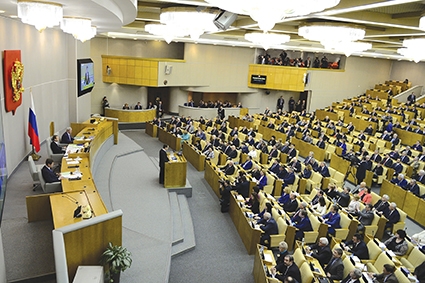Russia’s Parliamentary Elections: Pretext to Putin’s Presidential Campaign
On 18 September, 2016, Russia finally “took care” of the parliamentary elections that were supposed to be held in December this year. This is the seventh convocation of the Russian Duma since the federation declared its independence in 1991. According to the final results of the elections, the ruling party, “Edinnaya Rossia” (United Russia) registered a 4 percent increase in votes since the last elections, managing to obtain enough seats to secure a constitutional majority.
Having 343 Members of Parliament, the ruling party becomes even more dominant and a decision-making political entity that can do everything the Kremlin might ask for on a legislative basis, including adopting a number of notorious legislative initiatives.
Two puppet opposition parties, openly pledging their allegiance to the Kremlin incumbent administration and personally to President Vladimir Putin, the “Liberal-Democratic Party” led by Vladimir Zhirinovsky and “Spravedlivaya Rossia” (Just Russia) led by Sergey Mironov, obtained only 39 and 23 seats in Parliament respectively. And the somewhat opposition-like party, “Russia’s Communist Party” led by Gennady Zyuganov, came second, earning only 42 seats in Parliament. This means that Vladimir Putin can personally account for 405 mandates out of 450. Moreover, on orders given allegedly directly by Putin, Vladimir Vasiliev, ex-General and member of the so-called “Siloviki” informal political group, was appointed as chairman of the ruling party in Parliament. In addition, the ruling party will have six positions for Deputy Speakers.
The first seating of the Duma focused on increasing and intensifying its activities at regional and international levels. The latter is very important for Georgia and it means that after a period of relative inactivity, the Russian Duma will be intensively involved in foreign-policy making provisions and especially those designed for the “nearest abroad”, including Georgia.
It is symbolic that at the last stage of the parliamentary elections in Russia, the Russian Communist Party leaders were actively involved in the Georgian Parliamentary election campaign, providing political and probably financial support to their Georgian colleagues whose standings have been on the rise in recent times.
The ruling party was very active in Georgia as well, demonstrated when one of the more influential and powerful members of the Russian Parliament (re-elected), member of the General Council of the ruling party and Deputy Chairman of the fraction, Oleg Morozov, came to Gori to spend his “holidays” in Georgia at the most critical phase of the election campaign for his party. In 2012, Morozov was elected as one of the coordinators of internal politics at the Kremlin administration.
By gaining the constitutional majority in these elections, Vladimir Putin won the first battle for winning his fourth presidential term and his aim to further cement his indomitable presence in the “political vertical” inside the country. However, considering that only 47 percent of the population (compared to 60 percent in 2011) came out to vote for the ruling party, one could assume that Putin’s rating might be spiraling downwards too, hence his attempt to increase his political weight and position in the “political vertical”.
The constitutional majority is indeed a guarantee for adopting any and every amendment reinforcing presidential power and even prolonging terms for presidency, as well as for changing dates at whim for the presidential election.
The favoring odds enable the Tzar in the Kremlin to force through vital reforms in law enforcement structures and make life difficult for civil society (for instance, through creation of the mega-monster special service “National Guard” department where he mobilizes more than 400 thousand servicemen, Putin reinforced a new Russian version of the Soviet KGB – Ministry of State Security).
Nevertheless, the low turn out for the elections demonstrated notable frustration from the Russian population and their general disillusionment, acknowledged by Putin himself when he brought forward the parliamentary elections from December to September.
This is a very unique situation when on one hand Vladimir Putin reinforces his position and increases leverage but on the other he is weakened, drained of popular support due to the rising economic and social problems in the country. However, the elections have demonstrated that he will put his candidacy for a fourth presidency term and will, in all probability, win the elections.
Dr. Vakhtang Maisaia












